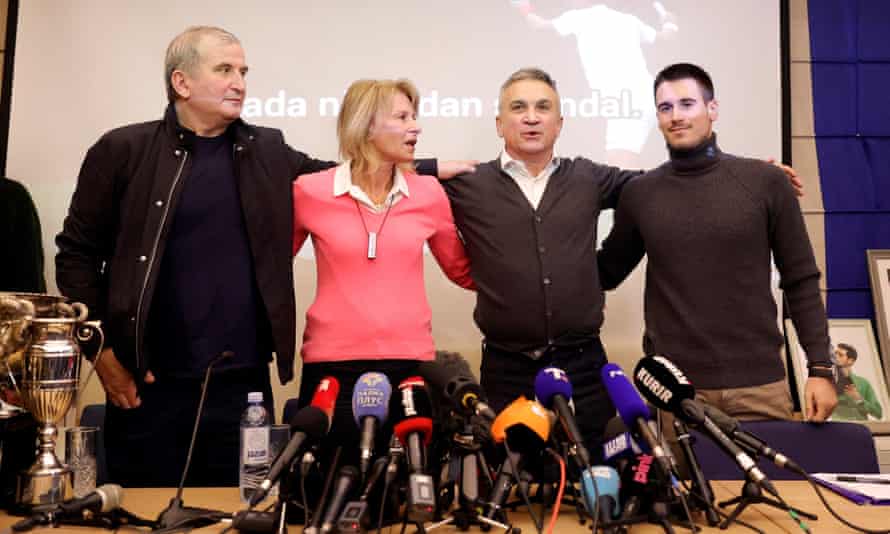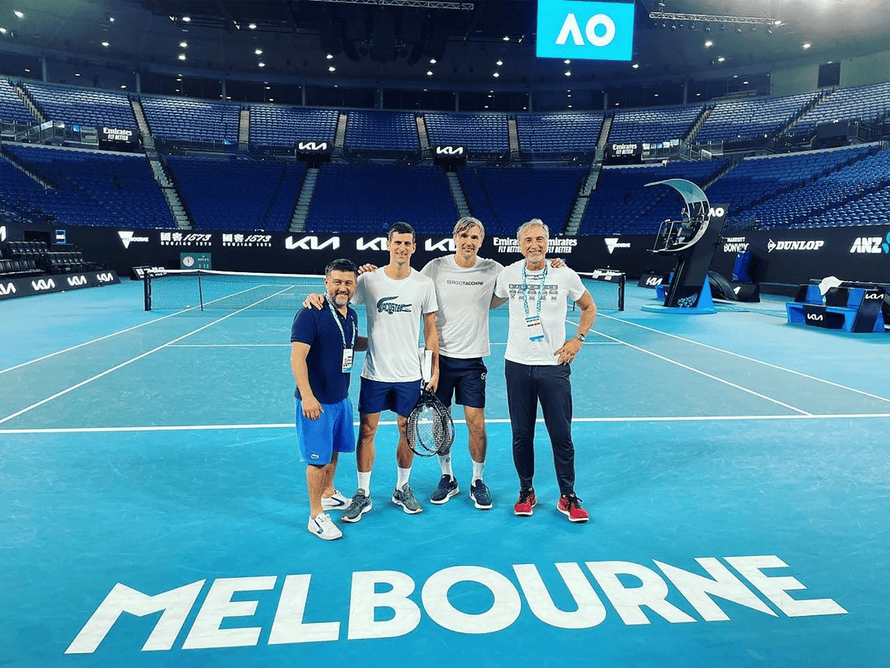As a sleek, black car drove from the gates of the Hall & Wilcox lawyers’ office on Collins Street and out into the heart of the Melbourne central business district, it was immediately surrounded by masses of people. The large Serbian community in Melbourne had been driven into action over the previous four nights by Novak Djokovic’s continued spell in immigration detention and, as they gathered, they perfectly reflected the turmoil of the moment.
They cheered loudly at Djokovic’s release from detention, but false rumours of a rearrest had also quickly spread. Fans responded by chanting “free Nole”. Some jumped on the roof of the car and others banged on the window. They were stopped only by the tear gas sprayed by police as they dispersed them.
After four nights of detention, Novak Djokovic’s remarkable week in detainment came to a quick, triumphant resolution. He is now free but not quite. He won his hearing on Monday on procedural grounds due to the treatment he received by border force officers in the early morning upon his arrival in Melbourne. His victory was a consequence of the judge, Anthony Kelly, deciding that the procedure for cancelling Djokovic’s visa was not correct. The government still reserves their right to cancel his visa another time and they are contemplating whether to do so. “The stakes have now risen rather than receded,” said Kelly.
As Djokovic began his journey towards Melbourne a week ago, Scott Morrison, the prime minister, spoke of the need to ensure that Djokovic was treated like anyone attempting to enter Australia’s borders. In a sense, it was a mission well accomplished. As with the immigrants trapped indefinitely in the hotel Djokovic resided in, his border interview provided helpful insight into how people really are treated in such predicaments. Djokovic had arrived in Melbourne airport just before midnight and after numerous discussions, he was handed the “notice of intention” regarding the cancellation of his visa just before 4am.
Faced with the prospect of immediate deportation, Djokovic was given just 20 minutes to explain why he should be allowed into the country. When he politely told the Australian Border Force that he needed to speak to his lawyers and Tennis Australia, he was first given until 8.30am to respond before being pushed to decide sooner. Believing that there was no chance of any other outcome but a cancelled visa, Djokovic relented.
Djokovic is prominent and wealthy. There was always a chance that he would appeal the visa cancellation and expose the interview process. So many people in a similar uncomfortable position do not have the luxury of hiring a team of lawyers to dissect those procedural ills. It is an important insight and case study into how the immigration authorities are for regular people and how helpless most people are when at the mercy of the border force.

As Djokovic’s hearing focused almost entirely on the procedural details during that first meeting with the border force, so much remains unresolved and the number of questions still to answer has only multiplied. After the released court documents over the weekend had indicated that Djokovic had taken a positive Covid-19 test on 16 December, Djokovic’s interview and PCR test certificate confirmed it.
The reason Djokovic was able to acquire his exemption for Melbourne was due to the positive Covid-19 test result on 16 December, determined on the same day. Yet Djokovic was seen around Serbia at events in the days after that date. L’Equipe reports that they interviewed him and gave him a photoshoot on 18 December, two days after the date of his test.
Djokovic either knew he was infected yet still continued to spread the virus, did not know about his result for two days after his positive test or there are questions to be asked about the test itself. When asked about his older brother’s public appearances during the Djokovic family press conference, Djordje Djokovic, Novak’s youngest brother, immediately cut the interview: “OK, so, uh, this press conference is adjourned,” he said.
Either way, it seems likely that Djokovic had sought out a loophole that would allow him to compete in Australia without vaccination and, in the end, he found one. The initial deadline for players to submit their medical exemptions was one week earlier than Djokovic’s test but Djokovic was still able to acquire an exemption from Tennis Australia and the Victorian government.

While Djokovic has made some questionable decisions, he has garnered sympathy for the predicament he found himself in with overzealous border force. Likewise, it should have been Tennis Australia’s job to make it clear how ill-advised it would be to travel to Australia without being vaccinated or having a genuine undisclosed medical issue.
As Djokovic returns to training, he has generated a whole new fanbase after becoming a cause célèbre for anti-vaxxers and far-right figures, not least Nigel Farage, who flew off to Serbia and was beckoned into Djokovic’s restaurant by his brother. Djokovic will have the opportunity to embrace them or distance himself.
By the end of a long day, Djokovic announced on social media that he had returned to practice for the first time in over a week and trained on Rod Laver Arena. “Despite all that has happened, I want to stay and try to compete at the Australian Open,” he said. “I remain focused on that. I flew here to play at one of the most important events we have in front of the amazing fans.”
Sign up to The Recap, our weekly email of editors’ picks.
Although he looked ahead to the week to come, his status remains up in the air. It remains to be seen if the Australian federal government will have another bite at the cherry and exercise those powers to deport him, which could mean that he is not allowed to re-enter for three years.
If he is able to compete, he will attempt to play. If he is able to stay in Melbourne for the duration, it seems likely that, even without an ideal amount of practice, he will channel his frustrations into competing for his 21st grand slam title and 10th Australian Open title. He could be extremely difficult to beat. It remains to be seen if he will still be in the country next Monday.

